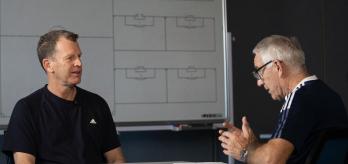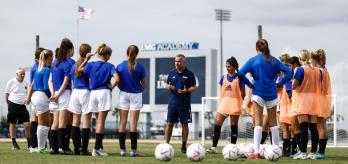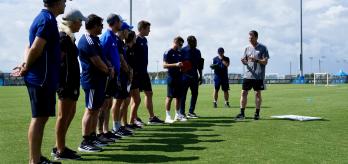The role of the coach educator developer is crucial to the development of better Coach Educators who, in turn, help shape better Student-Coaches. In this session, FIFA Senior Coaching and Player Development Manager Giovani Fernandes and FIFA Technical Expert John Peacock work together as Coach Educator and coach educator developer. Fernandes demonstrates how a Coach Educator works on the pitch to engage a group of Student-Coaches who observe the practice.
Pre-session meeting
To begin the mentoring process, the Coach Educator and coach educator developer engage in a pre-session meeting. During the pre-session meeting the role of the coach educator developer is to:
-
Discuss the Coach Educator’s session plan, objectives and approach
-
Provide any appropriate feedback or further considerations
Session Introduction
Fernandes sets the scene for the session by taking the classroom onto the pitch. This skillful tactic demonstrates how to plan and prepare a Coach Educator model session. Fernandes incorporates the use of visual aids and peer-to-peer group work.
Session observation
During the practical session, we see how the coach educator developer adopts an effective position to allow for observation and active listening. The coach educator developer ensures the position they adopt does not distract or interfere with the session or interactions between Coach Educator and Student-Coaches. During the session, the coach educator developer takes appropriate notes to feedback to the Coach Educator during the post-session feedback.
Feedback
The post-session feedback process is critical to supporting the development of better Coach Educators. During this meeting, the coach educator developer discusses any observations and feedback noted during the session. It is crucial for the coach educator developer to create a positive learning environment where feedback, discussion and reflection is encouraged.
Learning framework: LEARNS
The Coach Educator adeptly applies the LEARNS principles when discussing the coaching process with Student-Coaches. From the outset, the Coach Educator engages the Student-Coaches by assigning tasks to be completed during the session, emphasizing learner-centeredness and active participation. Through thoughtful questioning, The Coach Educator fosters a reflective learning environment throughout the session. Finally, the Coach Educator challenges the Student-Coaches to develop activity progressions, ensuring they are stretched intellectually.
Furthermore, in feedback the session between the coach educator developer and Coach Educator, adult learning principles are evident. Reflective questioning and the introduction of new information are consistently employed. These techniques are particularly notable in discussions about football language, field positioning, and the complexities of managing both players and Student-Coaches simultaneously.
Meet the needs of each learner by using a range of learning methods
Establish a positive learning environment where self-esteem is enhanced
Encourage individuals to apply their knowledge and skills
Create opportunities for self-reflection and connection with past and future experiences
Deliver new skills and knowledge
Provide each individual with optimal challenge
As a coach educator developer you should aim to:
- Create a positive learning environment and connect with the Coach Educator
-
Take up effective positions during all elements of the coaching process ensuring you can observe and listen without interfering
-
Provide evidenced feedback
-
Reinforce good practice
-
Encourage the Coach Educator to think critically in order to provide a better experience for Student-Coaches
Reflective questions
-
As a Coach Educator, which other strategies can I use to promote active participation of Student-Coaches in a practical session?
-
How important is to create and maintain a positive and safe environment for the Student-Coaches?
-
How can I improve my reflective questioning skills as a Coach Educator and as a coach educator developer?











